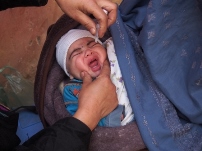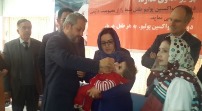 A baby received two drops of the oral polio vaccine in Balkh provinceKabul 18 March 2015 - The first round of national immunization days (NIDs) in Afghanistan in 2015 was launched on 15 March by H. E. Dr Ferozuddin Feroz, Minister of Public Health of Afghanistan. The three-day NIDs campaign targeted over nine million children under five years of age in all of Afghanistan’s 34 provinces. Over 60 000 district coordinators, cluster supervisors, campaign monitors and volunteers were involved in administering polio vaccines and vitamin A capsules to children.
A baby received two drops of the oral polio vaccine in Balkh provinceKabul 18 March 2015 - The first round of national immunization days (NIDs) in Afghanistan in 2015 was launched on 15 March by H. E. Dr Ferozuddin Feroz, Minister of Public Health of Afghanistan. The three-day NIDs campaign targeted over nine million children under five years of age in all of Afghanistan’s 34 provinces. Over 60 000 district coordinators, cluster supervisors, campaign monitors and volunteers were involved in administering polio vaccines and vitamin A capsules to children.
The formal launch ceremony was attended by WHO Representative Dr Richard Peeperkorn, UNICEF Deputy Representative Dr Lakshmi Narasimhan Balaji and a number of high-level officials from the Ministry of Public Health and the media.
Inaugurating the campaign, Dr Feroz emphasized the importance of high-quality campaigns in order to eradicate polio from Afghanistan and urged all sectors of the society to cooperate with vaccination teams and vaccinate all of their under-five children.
WHO Representative Dr Peeperkorn highlighted the importance of NIDs and the year 2015 for global polio eradication efforts as this year has been set as the target for complete polio eradication. “The low transmission season is an opportunity to stop the wild polio virus circulation. There is a need for enhanced commitment, quality campaigns and reducing the number of missed children during polio campaigns,” he said.
“The polio programme is neutral, it works with all layers of society which is of utmost importance to help ensure comprehensive implementation of polio programme activities all over the country,” Dr Peeperkorn said. He also referred to the important role of the polio field workers who are working relentlessly in sometimes extremely difficult circumstances, trying to reach and vaccinate each and every child to make polio eradication in Afghanistan a reality.
 Minister of Public Health Dr Ferozuddin Feroz vaccinates a child during the NIDs inauguration ceremonyIn addition to polio vaccination campaigns, Dr Peeperkorn also emphasized the importance of other components of polio eradication activities, including acute flaccid paralysis (AFP) surveillance, routine immunization, communication and social mobilization, vaccine management, Expert Review Committees and Certification Committees, as well as utilizing polio assets in strengthening routine immunization.
Minister of Public Health Dr Ferozuddin Feroz vaccinates a child during the NIDs inauguration ceremonyIn addition to polio vaccination campaigns, Dr Peeperkorn also emphasized the importance of other components of polio eradication activities, including acute flaccid paralysis (AFP) surveillance, routine immunization, communication and social mobilization, vaccine management, Expert Review Committees and Certification Committees, as well as utilizing polio assets in strengthening routine immunization.
UNICEF Deputy Representative Dr Balaji highlighted the need for enhanced social mobilization and communication activities in order to reach all children in every corner of Afghanistan with polio vaccination.
During the NIDs inauguration, WHO and UNICEF reaffirmed their commitment to support the Ministry of Public Health in strengthening routine immunization and polio vaccination programmes across Afghanistan. With 28 cases of polio reported in Afghanistan in 2014, the country must redouble its efforts to eradicate this disease by ensuring every child under the age of five is protected with the polio vaccine.








